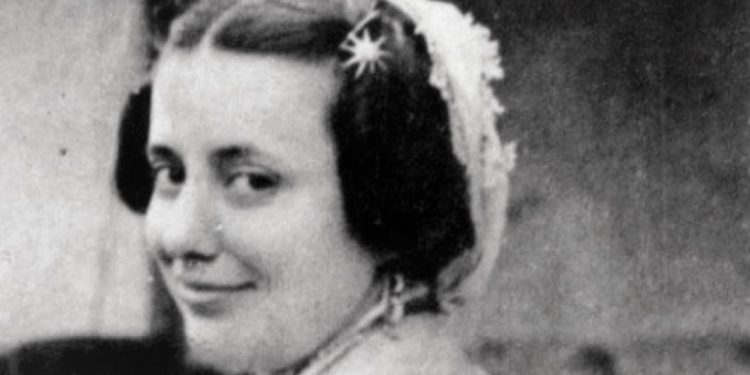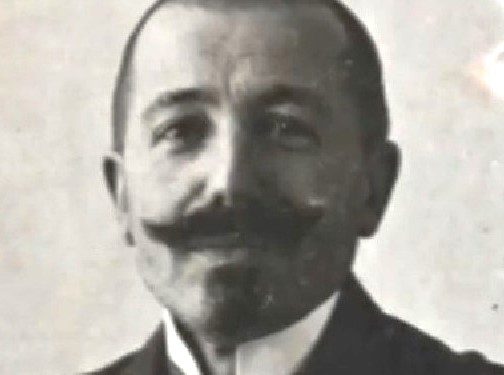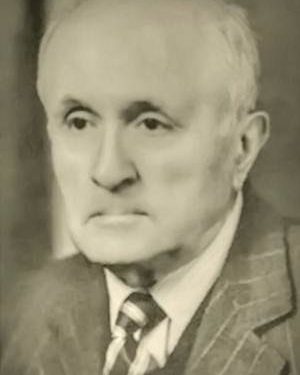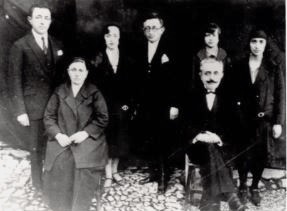By Dr. Uran Butka
-Essay on two souls of literature and culture-
Memorie.al / Already in 1992, as a worry of previous impossibility, I researched in the archives, the works and writings of Musine Kokalari, her newspaper “ Voice of Freedom” archival documents on her tragic fate and wrote the essay “Musine’s Message” Kokalarit” as well as a documentary film script for him. Since these trials were incomplete and non-exhaustive, I have been continuously engaged, each time, finding something new in her life and work, not yet fully discovered.
In the State Archives these days I discovered an unknown letter of Musine Kokalari, addressed to the friend and scholar Sotir Kolea. In the archive, there are also several letters of the writer Musine Kokalari, with cultural personalities of the Albanian and foreign world, which shed light on her intellectual personality, extraordinary for that time, her creative process, her awareness of writing and her life activity. , cultural and political. The most prominent is the correspondence with Mid’hat Frashëri, Aleksandër Xhuvan, Sotir Kolë, Ernest Koliq, Eqrem Chabejn, Xhuzepe Skiroi, Angelo Leoti, etc., correspondence already published.
Sotir Kolea was a researcher, lexicographer, author of a dictionary of several languages based on Albanian, author of “A bunch of proverbs”, publicist and publisher of the newspaper “L’Albanie” in Switzerland in 1914, as well as a prominent activist of our national issue, director of the National Library during the years 1928-1937. After this time, he settled in Elbasan, the center of Albanian education and studies. It was there that Musineja sent her letters and asked her for a critical judgment, for her first works, since there was a lack of real criticism, as she wrote: “In Albania you don’t find satisfaction or encouragement, because there is no criticism in the true sense of the word “.
The first Albanian writer, was aware of the path she had taken, the originality, but also the difficulties in her literary direction and publications, starting from her first book (1944) “As my old grandmother tells me”, where she gazes with the eyes and mind of the old woman, while in the book of fairy tales “Around the Hearth” (1944), the fairy-tale narration comes from the old grandmother, but the world is seen and presented with the eyes and mind of the child and for the child.
Musineja, as he himself affirms, comes out of himself and comes down to the age of children, communicates and dialogues with them simply like a child, unlike many other writers who speak and write above their age and literary experience and remain cold and foreign.
Although some well-known writers of that time had stepped on this footing, such as Mitrush Kuteli with “Old Albanian Stories”, Ali Asllani, with “Hanko Halla”, or Ernest Koliqi, with “The Shadow of the Mountains”, etc., but unlike those whose work is genuine literature, or unlike the “Fairy Tales” of Sotir Kole, which were genuine from the mouth of the people, Musineja follows her original path, between popular narrative and her literary authorship.
“My idea was to give the little ones a book, so that they don’t tire themselves, they don’t find it in a foreign world. In an Albanian world, in a hearth, where even the great ones tell you, that this is really how we lived. When I wrote it, it was not me, but a little Musine and as such – with simple thoughts and question-answer language…! It seems to me that I was able to enter the souls of the little ones” – Musineja ponders.
“I am sending you the “Gjirokastrite wedding”, – she wrote to Sotir Kole, in a previous letter, – but not all, because it is not over yet. Work is slow at the printing press. It stuck in the heads of the workers, but still there are some mistakes. Let’s see how you will find it”…!
The newly discovered letter, dated February 8, 1945, is unknown and not included in Musine’s publications. She writes this letter in the most miserable moment of her life. One can think that the most terrible time of her life was that of Burrell prison, then the long exile and the serious cancer disease that eventually took her life. But no, these periods of untold suffering in her life, she faced with dignity, strength of character, loneliness and inner freedom.
“The soul needs solitude, to be free”, she writes. “We seek freedom outside of ourselves, while it is within us.”
In the letter we are examining, we find the worst spiritual moment of her life, “severely stricken, covered with mourning, and in the greatest wave of life.” As soon as the communist regime shot her brothers, Muntazi and Vesim Kokalari, without trial. “The bullets that laid Muntazi and Vesim dead on the ground, have also hit us, they do not leave us corpses alive for life, to suffer forever as long as we are alive” – she writes bitterly in this letter.
Musineja was from a well-known family of Gjirokastra. The only daughter of the well-known lawyer Reshat Kokalari, sister of the brothers Muntaz, Vesim and Hamit Kokalari, prominent activists of Albanian culture, founders of the bookstore “Venus” and of the Publishing House “Albanian Messages”, founded in 1942, which published and spread works from Albanian and world literature, such as; “Hamlet” and “Macbeth” by Shakespeare, “Rubairat” by Omar Khayami, “20 years of Balkan confusion” by Durham, “Ivanhoe” by Scott, “Kosova-the cradle of Albanianism”, by Ham Kokalari, Musine’s books and others .
Musineja herself was an intellectual, who was nourished by the national ideology of our great Revivalists, she called herself; student of Sami Frashër, she idolized Naim and Mid’hat Frashër, while she had western culture, she was a democrat and an opponent of any totalitarian ideology and practice.
“In my little ode,” she writes in her diary, “in front of me I have placed the photograph of the outstanding illuminist, Sami, of the poet Naim, of the patriot Sotir Kolea, of the worker of the Albanian language and of the National movement, Jani Vreto, of the teacher Koto Hoxhi, the thinker Naum Veqilharxhi, the honorable De Rada and the sage Aleksandër Xhuvani. In my loneliness, I am not alone, I live with honorable, learned and democratic people, who have worked for the country, for the motherland until they closed their eyes…! I am their student…”!
As is already known, the leader of the communists, Enver Hoxha, who was Musine’s second cousin, spared not only him, but the entire Kokalare tribe. On November 12, 1944, the red terror, ordered by him and implemented by Kristo Themelko, shot without trial and without guilt, near the hotel “Bristol”, in the capital, 11 prominent personalities of Tirana, among them her brothers; Muntaz Kokalari and Vesim Kokalari. Syrja and Emin Kokalari were also shot without trial, Hivziu died in prison and Isai in exile, Muniri killed himself, Musineja was imprisoned and exiled. Their sons and grandsons were thrown into the streets, exiled and persecuted endlessly, until the collapse of the communist regime in 1991.
Muntaz Kokalari, Musine’s brother, tells us the reason for this family persecution, in a letter on 9.11.1944, which he wrote to Mrs. Makbule, three days before his shooting:
“We are experiencing difficult days. I have decided with sorrow in my heart, to leave my beautiful Albania, from my beloved family…! I took this decision after some of my trusted friends informed me that my life and that of my relatives is in danger from the accused, Enver Hoxha. He has ordered the red devils against us. This is understandable: purely for personal reasons.
This is the misfortune of our nation and of poor Albania, which has fallen into the hands of a monstrous, scheming, vengeful, spiteful, cunning, megalomaniac, selfish, gambler and liar man, who loves the people under him; even when he was out for studies, he didn’t take any exams, he stayed behind cabarets, casinos, etc. We Gjirocastrian intellectuals, we all know how much skin is worth, that’s why he wants to annihilate us…”!
And destroyed them. Musine was spiritually killed by the absurd and criminal persecution of her family. “This was my fate, more bitter than death”, she wrote to Sotir Kole. At the same time, the bitter fate of the painful interruption of her creativity. “Today, I took the first book off the press and I am sending it to you. Keep it for yourself, as a memory of my best work, which I believe I have done, and my last. You keep it for yourself, because you don’t sell it. The first, that it is a wedding and in mourning, seems ridiculous; the second, that I don’t want to work or write anymore”.
It is about the book “Sa u tund jeta” (Gjirokastrite wedding, where the writer presents precisely the anthropology, rites, customs, clothes, dialogues, songs and dances, tears and joys of the Albanian wedding, the result of a long, passionate and indefatigable to folklore – but in function of the literary text), a book that Musine Kokalari sent to Sotir Kole just after it was published, as a last memory, in a time of mourning, but which she also considered as her best work, which unfortunately it was also her last publication, because she could no longer write.
“Why work?! Why write? Why live?” – cried the writer Kokalari, in her endless despair.
This despair, but also human and intellectual revolt, also includes her spiritual father, Sotir Kole, the venerable father, – as she used to say. In Sotiri’s reply letter (the manuscript is in the Archives of the Ministry of the Interior, Fund 140, File 2912, Year 1945, previously unpublished letter), we find the pain and tears of Kole, for the loss of her brothers, Muntaz and Vesim Kokalari, for whom “I cried from afar, the two precious friends who left” and left us in the prime of life; I cried for the two young men, who were not only a glory for the few, but were together and the hope for us, for the future, that the nation needs, for sons like Mumtazi and Vesimi, with a heart for all, with judgment sober and mature mind”, but we also find his incompatibility with persecution; “that’s why we go wild”!
He writes to Musine: “The slap of fate that hit you, ladies, and your door, is so terrible, that maybe even a name is not special in your language, in the language of a nation, that for a long time For centuries, they have been beaten and roasted and burned among the captives. I can’t even find words of consolation, because the black man who crushed your heart and yours is one of those who can’t be softened by words or tears.
Together with you and the good friends of your door, I have cried far away the two precious friends who left us in the prime of life; I cried for the two young people, who were not only a glory for the few, but were together and hope for us, for the future, that the nation needs a daughter, who were Mumtazi and Vesimi, with a heart for all, with judgment sober and mature mind.
To your heart and to God Ham, may you be the comfort of those who performed the heavy and difficult duties that today and again, I lay before all others the cheeks of the fathers and the cheeks of the minors and their mothers, whose lives have been torn apart by this savagery”!
However, the sage Kolea, even on the verge of death, gives courage, strength and guidance to Musina, to continue her life and work, that work is the remedy for everything, but also a duty towards oneself, humanity, the nation and the world.
“A stone of consolation, all so true I would forgive you for your work, this sacred duty both for yourself and for the world, which is from the heart, health of the body and a well of oblivion, because of the hardships of life; duty towards oneself, not only the heart beats but also afterwards, because life extends more or less even beyond the grave, duty towards the dead, which man has towards his own and towards those who have been before, duty towards friends and towards humanity, duty to the nation, the motherland and the world”. Memorie.al

















